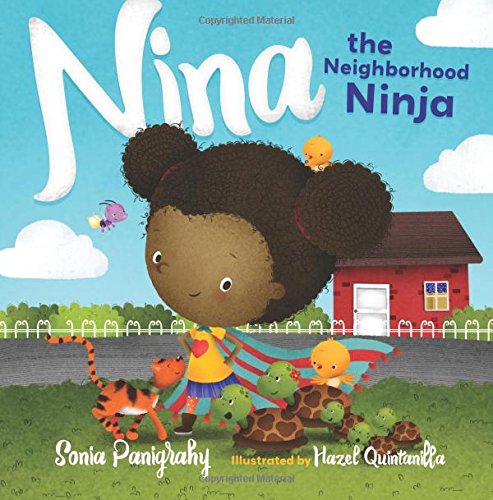Are the Genders Equal in Childrens Books?
Today I'm delighted to welcome Sonia Panigrahy, the author of Nina the Neighborhood Ninja to my site. (Click on the link for my review, or find it on Amazon here). Lots of picture book and storybook heroes are boys, so it's nice to read this one with valiant Nina as the protagonist. And it's great to read how Sonia feels about those children's characters.
Gender Equality in Children’s Books, by Sonia Panigrahy
Over the past decade, I grew into the
role of an aunt to my network of friends and family with children. Having been
a book worm as a child, I was excited to share the love of reading with them, opening
a new world of imagination and knowledge. We often say that a child’s brain is
like a sponge and books are a wonderful way to help them absorb life’s lessons.
The books society produces reflects the lessons of what our society chooses to teach its members, including its youngest members. Progressive societies see education as a social equalizer, as noted by educational reformer, Horace Mann. However, browsing through the colorful spines of children’s bookstores, I found that the books on the shelves were perpetuating social inequality. I continually noticed that it was much easier to find empowering books for boys than for girls. There were plenty of adventurous male characters to choose from, but when I searched for similar stories for young girls, I found the selection dismal. It was heart-breaking knowing how empowering books can be for children, but realizing for girls, many books were doing just the opposite.
Plenty of children’s books, read by our
society’s members with the most expansive, impressionable, and open minds, are
in fact subtly telling little girls how to and not to behave. The girls I know
are adventurous in the same way boys are. Yet, the children’s books available
to them, while many portraying girls as smart, they will not put a girl as the
lead strong character. What is it that our society is teaching our children by
allowing children’s book to foster inequitable gender roles that don’t allow
our girls to be both smart and strong?
We continue to lack
enough books that allow all children to find universal and valued themes of
confidence, curiosity, braveness, creativity, strength, intelligence, kindness,
compassion, generosity, and resilience. Storylines are not representative of
girls as they are, but rather, what they are told to be. Our literary orbit
continues to revolve heavily around boy’s needs, but this needs to
change. If the books that are published are about appealing to a mass
market, then appeal more to the 51% of the U.S. population-- females. Girls
need to have a place in the literary orbit, and that includes also being at the
center of the superhero narrative. Children need to see themselves in books—it
validates their value in society.
This inequitable portrayal of females
in narratives detrimental to girls, but it is harmful for young boys to be
taught and then reinforce narrow, limiting stereotypes. It was with this
sense of inequity for young girls and boys that I decided to write my book,
“Nina the Neighborhood Ninja.” It features a young girl of color named Nina,
about 5 years old, who is the brave superhero courageously leading the way
using her brains and strength to creatively and kindly rescue those in need.
Just like most of the girls I know.
Thank you so much, Sonia, for writing the book, and for bringing the problem to our minds. You've got me thinking I really should try again to get my Hemlock stories published - their strongest protagonist is a girl, and she rescues the boys ... well, except for the ones who are teasing her. She makes them think they're frogs.
About The Author:
Author
Sonia Panigrahy is a public
health professional, world traveler, adventure seeker, and fitness enthusiast.
She believes that life is too short to be bored!
Nina the
Neighborhood Ninja was created out of Sonia's lifelong love of
reading. As her family and friends begin to have children, she looked
forward to sharing this love with them. She believes that books are a
powerful way to empower impressionable young minds.
Sonia
was surprised that she could not find books for girls ages 3-6 years that
realistically identified females as intelligent, physically tough, brave, and
adventurous. She was disappointed that girls continue to be excluded from
the heart of the superhero story.
After
unsuccessful attempts to find a young girl superhero protagonist on the pages
of a book, especially one of color, she gave up. Then she created her
own.


Comments